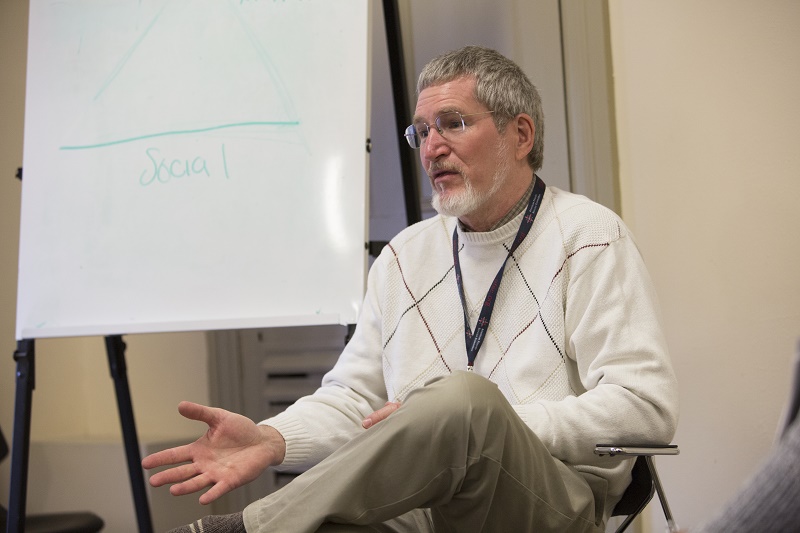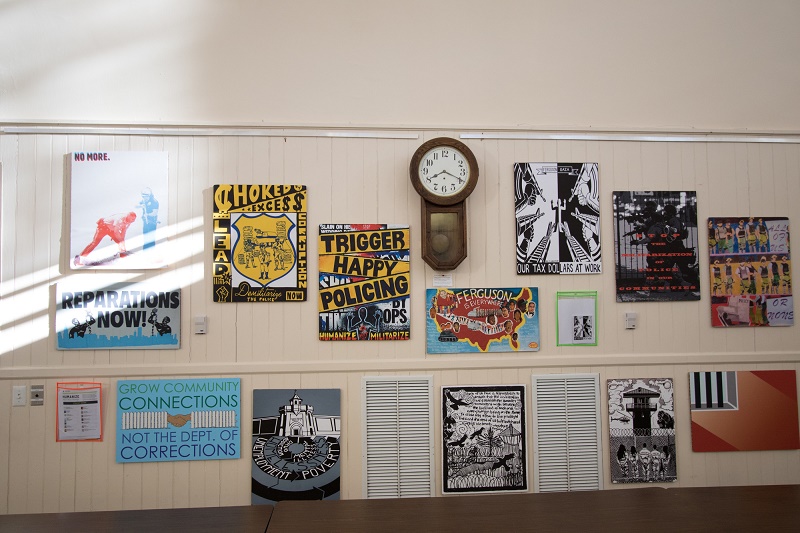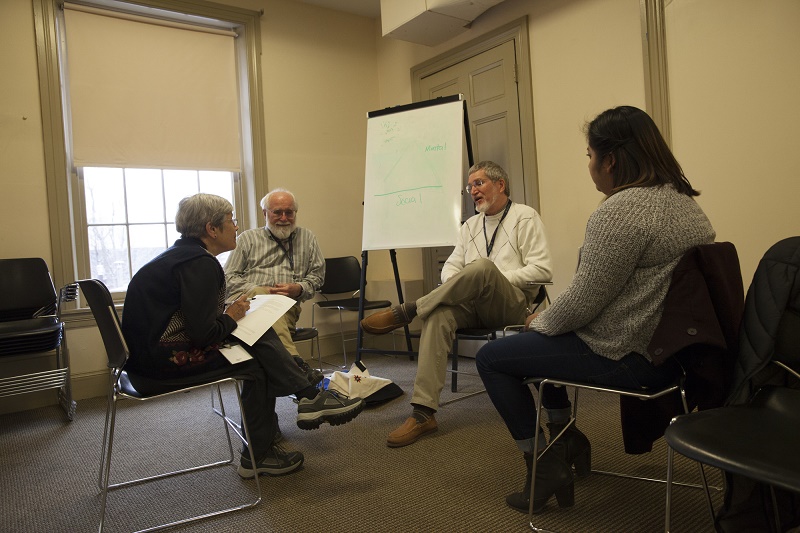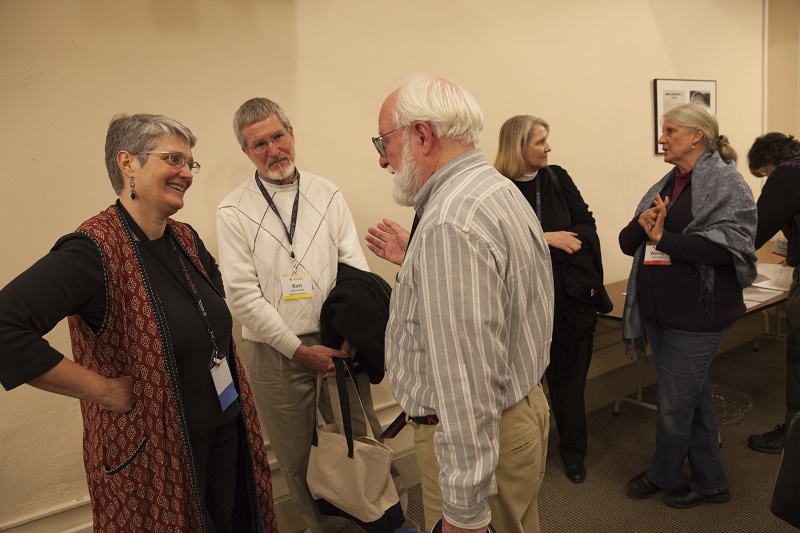
Ron Ferguson at the 2016 AFSC Corporation Meeting AFSC
Pam and Ron Ferguson were invited to lead programmed worship at AFSC's Annual Corporation meeting on March 5, 2016. Pam and Ron are the Co-Pastors of Winchester Friends Church in Winchester, IN, where they live out Friends' Testimonies with their church community through work in local food pantries, an active Peace and Social Concerns Committee, and Friends Council on National Legislation (FCNL), among many other activities. Part I can be found here. Here is Part II of their sermon delivered by Ron.
Scripture sources: Romans 12:9-21; 13:8-10
After working for several recent years with Friends Committee on National Legislation’s Policy Committee on a sensible public policy response to the militarization of American culture and life, we were gratified in late 2015 to receive AFSC’s invitation to join you in Philadelphia to share our spiritual reflections on that issue. In a sad way, the invitation came at a particularly poignant moment -- we had just been watching televised reports of the SWAT-style confrontation on a neighborhood street in San Bernardino that led to the deaths of the two people who evidently had committed mass murder in that city a few hours earlier. The cycle of violent act and violent response was breaking our hearts when AFSC called.
As I begin, please understand that we both were raised and trained among Friends who were part of Evangelical Friends International in Kansas and Idaho. As a result, theirs was the spiritual vocabulary we received as kids and is the language of faith that often rises first to our lips. For much of our adult life, we have worked with African and European Friends and with those from across the US, so we have been (and still are) in “language study” to expand our vocabulary and enable meaningful fellowship with a broad range of Friends. The things we have heard in our two days with you at this gathering tell us already that we are among genuine seekers of Truth who will help us find acceptable words that can unite us in the concern for a less violent world.
Our primary desire and intention here is to commend, and celebrate, and thank God for AFSC’s important, excellent work, and to share stories from our experience and study at a micro level that can give hope to AFSC’s work at this macro level -- hope that destructive cycles of violence and vengeance can indeed be broken.
In 2 Kings 6 around 850 BC, the prophet Elisha was ministering in the northern kingdom of Israel during a time when that region was gripped by a similar pattern of violence. They and the kingdom to their northeast, the Arameans, regularly engaged each other by military attack and retaliation in a quest for land, treasure, and regional power. At a time when the Arameans were on the offensive, their king in Damascus was becoming increasingly frustrated because his surprise attacks and ambushes against Israelite troops were failing. Somehow, his top-secret plans were being leaked to the Israelite king. According to the scripture’s account, God was protecting the Israelites by telling Elisha what was planned and sending him to warn King Joram. When the Aramean king finally discovered the source of the leak, he dispatched a strong unit of soldiers and chariots to go find and capture or kill Elisha. They located Elisha at the village of Dothan and moved in at night to surround the town.
The 2 Kings story tells us that when Elisha’s servant went outdoors early the next morning, he found that they were surrounded by Aramean troops who undoubtedly intended Elisha no good. He hurried to alert Elisha and asked in alarm what they could do now. Elisha replied with quiet confidence that “those who are with us are more than those who are with them,” then prayed for God to open the servant’s eyes. When the servant went back to check the situation, he saw that the Aramean soldiers who ringed the village were themselves surrounded by an even greater force of flaming chariots and horses.
As the Aramean troops began advancing towards Elisha and his servant, Elisha asked the Lord to do an opposite miracle to them -- to close their eyes. Immediately the Arameans were blinded and rendered (temporarily) incapacitated to carry out their mission. Elisha told them, “This is not the place, this is not the city” where they would find what they were seeking. He then rounded them all up and escorted them into the city of Samaria, Israel’s capital and military headquarters. One can only imagine their fear when Elisha prayed again, this time that God would open their eyes. In an instant, they realized that they were powerless captives in the stronghold of their archenemies
It would not have helped their state of mind when Israel’s king soon appeared to see what Elisha had brought in. When he realized who they were, his immediate, enthusiastic request to Elisha was for the go-ahead to execute the prisoners. Elisha, however, appealed to the king’s sense of humanity and morality and instructed instead that the Arameans be served a banquet. The Israelites literally fed their hungry enemies and gave them drink, and when the feast had ended, they released them and sent them home.
And the scripture reports that from that time forward, the attacks from Aram upon Israel ceased. The cycle of destructive violence was broken -- at least temporarily.

When I was first given the theme of this Corporation gathering, I jotted it down as “change the message, change the world.” (Later, I learned that it was actually “change the story....”) My first thought was “O please don’t change Friends’ message, just help us to recover it and learn to live it!” After working with many faith communities in the US and in other countries, it is Friends’ unique spoken and lived expression of the Gospel that causes me to continue choosing to be a Quaker follower of Christ, rather than one of the many other possibilities. The principles George Fox consistently proclaimed wherever he traveled in ministry -- principles that, when acted upon, can break cycles of vengeance and violence -- are the same ones illustrated by Elisha’s actions in 2 Kings 6, by Jesus’ life and teaching, and in Paul’s instruction in Romans 12 and 13.
From Fox’s Journal, it is clear that the first thing he nearly always said to new audiences was “Christ has come/is present to teach his people himself.” That declaration highlighted the importance and necessity of considering worship primarily to be an act of spiritual listening in order to be taught and led by the Spirit of God, rather than by fear, money, or public opinion polls. Fox was able to proclaim that because he had personally, powerfully experienced it. At a moment of utter despair in his search for truth that would “change the story”, Fox sensed the Spirit saying to him, “There is one, even Christ Jesus, that can speak to thy condition.” First by acknowledging that he had a condition needing spoken to, and then by disciplining himself to learn to listen to this Inward Teacher, Fox received spiritual power and insight for a message that did indeed change the narrative. The prophet Elisha, too, had learned to hear and see spiritual truth which even other religious people failed to grasp. It was that spiritual vision that enabled him to trust God’s care and protection in the face of a deadly threat, and to respond with life-preserving, peacebuilding compassion rather than fearful violence.
A second narrative-changing truth which George Fox proclaimed everywhere he went was that there is “that of God in every person.” It was an affirmation of Jesus’ teaching of the ultimate importance of loving one’s neighbor as oneself. Jesus then defined neighbor to include even adversaries and social outcasts, as he made clear in the Good Samaritan story (Luke 10) and the final judgment parable about separating the sheep and goats (Matthew 25). Because the same Spirit was Elisha’s teacher hundreds of years earlier, he was enabled to see that of God even in the pesky Arameans trying to hunt him down. He changed the narrative because he recognized the sacredness of their lives, their equality with him in the eyes of God, and the necessity of giving them right treatment despite their hostile intentions towards him.

Fox and the early Friends changed the narrative also because of their discovery that they had “come to live in the virtue of that life and power that takes away the occasion of war.” Note that they did not just know about that life and power, or just talk about it -- they had chosen actually to live in its virtue. They had decided to follow the costly, difficult path of truth that leads to shalom, the wholeness of life that makes violence not just unnecessary, but counterproductive. It was a 17th century version of William Barber’s Moral Revolution (about which we heard on Thursday night of this gathering). It was the same virtue in which Elisha prevented his Israelite king from doing the easy thing -- killing the captured Aramean soldiers so there would be fewer of them to come attack Israel next time. (That sounds sadly similar to the rationale so often given for the US drone program.) Instead, Elisha heeded Solomon’s proverb quoted by Paul in Romans 12, calling for a feast to feed the hungry enemy, then sending the Arameans home to their families.
Unfortunately, when you read on in 2 Kings, you learn that the cessation of hostilities between Aram and Israel did not last. Elisha eventually died, new kings came to power, and the cycle of violence and revenge started all over again. Perhaps if the Israelites had discovered Friends’ witness of a universal ministry, they would have been more diligent in teaching the changed narrative to new generations of their people. Instead, truth seemed to die with their charismatic leaders, and they began once again to be led by fear, greed, power, and selfishness rather than by the Spirit of God.
The 2 Kings story of Aram and Israel illustrates the truth that ending patterns of violence and revenge requires change by all parties to the conflict, but it also teaches that someone has to go first. Our Friends founders show us that the people who actually change the narrative and see cycles of violence broken will be those who live disciplined lives of listening to God; who consistently see and honor that of God in every person; who genuinely live in the virtue of spiritual Life and Power; and who do the work of Truth every day without waiting around for a charismatic leader. May the Lord help us to be those people in our time.
Related content:
The Third Reconstruction: Moral fusion politics & working for justice
Podcast: Bayard Rustin and the March
Letter from a Birmingham City Jail: What would King say today?
Realizing the Dream: A conversation with Vincent Harding